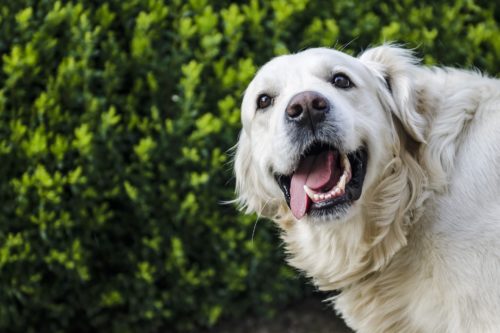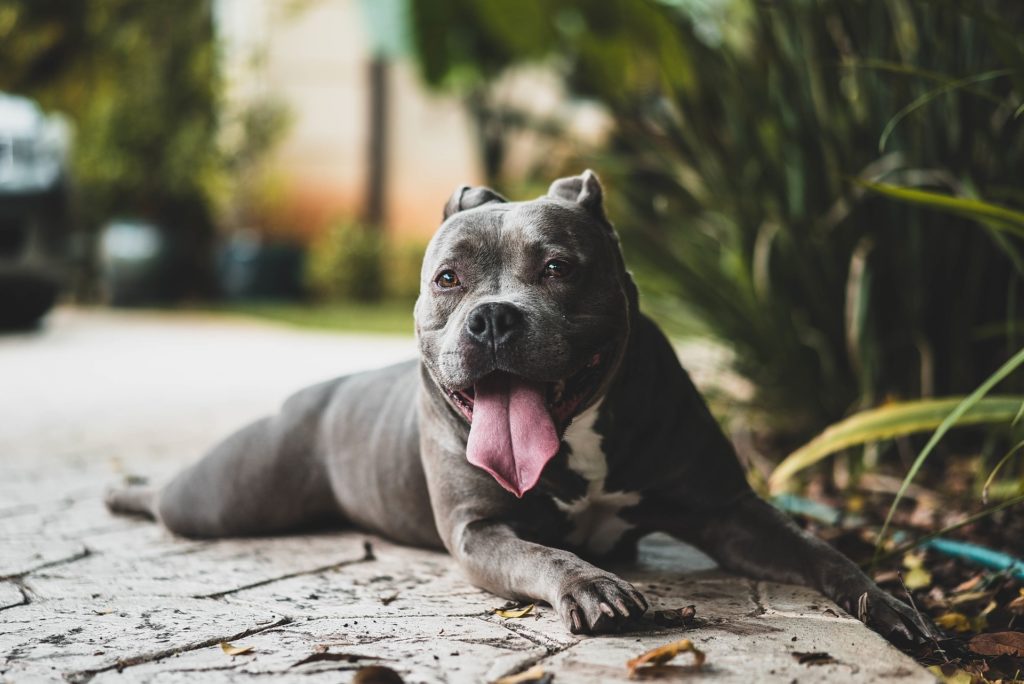Does your dog have anxiety? If so, there are a variety of treatments that could help ease their discomfort, such as over-the-counter medication, homeopathic treatments, and herbal supplements.
Not every dog will respond in the same way to these anxiety disorder solutions, so do what’s best for your pet. This may require a bit of trial and error and it should always include a consultation with your veterinarian first. Let’s look at some of the options you have to help alleviate your dog’s anxiety disorder.
Over-the-Counter Dog Anxiety Medication
With the approval of your veterinarian, you can give your dog anxiety medication to help ease his anxiety. Benadryl is commonly prescribed to help alleviate symptoms of anxiety in dogs. The antihistamine is known to serve as a mild sedative. When administered correctly prior to the environment or activity that may cause heightened anxiety in your pet, it can help him remain calm and relaxed.
However, before giving your dog anti-anxiety pills or any kind of medication, make sure you understand the side effects to look out for. Also, only give your pet the recommended anti-anxiety medication dosage from your veterinarian. Extra dosages can result in harm to your pet. Each dog responds differently to anti-anxiety medication due to the rate of absorption and other potential health conditions that may affect how well it works.
Despite being able to purchase Benadryl without a written prescription, it’s not advised to administer any kind of medication to your pet without a doctor’s go ahead. A dog’s anxiety is a delicate condition and must be treated properly in order to have control over it.
Homeopathic Treatments

If your dog suffers mild anxiety or you want to use more natural remedies to alleviate his symptoms and behavior problems, homeopathic treatments might also be a recommended solution. A combination of different flower essences including Star of Bethlehem and Cherry Plum may work for calming an anxious dog.
Since dogs can have allergies to certain medications, plants, foods, etc., it is again advisable to work with your veterinarian or a homeopathic specialist for pets to find a healthy solution for your anxious dog. Simply let your vet know you’d rather avoid prescription anti-anxiety drugs or medication or try all organic solutions first and he or she will guide you to options for your pet. With pets, what works for one dog’s behavior modification may not work for another. Even if you’ve received advice from other pet owners or discussion forums, confirm with your doctor before trying anything new.
Prescription Medication
In addition to Benadryl and homeopathic treatments, your veterinarian may recommend a prescription drug for your dog’s anxiety. Most of these anti-anxiety drugs can be administered orally and are best suited for your pet prior to the anxiety-inducing situation. Because anxiety medication typically takes at least 30 minutes before they start working, it’s best to give it to your dog ahead of time rather than waiting until they present symptoms.
For example, if you know your dog becomes more anxious when traveling, don’t wait until you’re in the car or on the plane before administering the drug. Plan ahead of time so it can already be working before the trip even begins.
Alprazolam, Amitriptyline, Clomicalm, and Buspirone are all potential medications that may be prescribed for your pet. The choice will be made by the veterinarian based on your dog’s current health, allergies, medical history, and several other factors. Never use another pet’s medication for your dog even if they’re in the same household. The way pets digest medication and their reaction to it will vary. What has been successful in one pet may not be the case for another.
Herbal Supplements
A regular vitamin regimen may help ease your dog’s anxiety symptoms. Herbal supplements such as Echinacea and Valerian Root may be organic options your pet will respond to well to treat both anxiety and excitability.

These are usually given orally via pills but in some cases, herbal drops may be available. Although this is a more natural solution, when you switch your dog’s daily diet in any way, check with your veterinarian and get the sign off before administering to your pet.
Your veterinarian can let you know what type of side effects to look out for when trying something new. There’s a chance your pet could be allergic to some of the herbal remedies used to calm anxiety, which you’ll want to keep an eye out for ahead of time.
Hemp-Based Products
By name, hemp may not be the first thing you think of when treating your pet. But pet-safe cannabis “treats” or oils have been used to treat dog anxiety. Cannabis or hemp products for pets use plant extracts and other organic ingredients that do not get your pet “high” as might be assumed.
A hemp-based product is not administered as a pharmaceutical but rather a nutrition agent for your pet designed to provide ongoing benefits. When considering options for your dog, discuss this alternative method with your veterinarian or other pet expert to learn about how it can help your pet be free of stress and anxiety.
Aromatherapy
Ever heard of using lavender at night to reduce calm or help you sleep? The same could be true for your pet. Essential oils applied to your pup’s paws or sprayed in his bedding, on chew toys, or other areas of relaxation can help calm your pet. It can also create a familiarity in scent for your pet if he’s traveling or being boarded.
Lavender typically works as a sedative to help your dog feel restful. Aromatherapy oils like chamomile provides calming and in some cases, pain relief. While sweet marjoram has been used to help with stress relief in pets. Watch out for allergic reactions in pets and discuss this kind of remedy with your veterinarian to get recommendations for the best kind of products to use. Essential oils can be easily found and used for your pet. Even if they don’t benefit as much from their use, you can use still use them for your own.
TLC
Soothing your pet can help relieve anxiety tremendously. When you know you’ll be away for a few days or if you have to take them in a car where they’re not typically comfortable, giving extra attention to your pet may be all he needs to get in the right mindset.
Anxiety in dogs is often caused from sudden, unexpected activities or moments. If you have a routine for when it’s time to go to the veterinary office, board a plane, or anything else that may cause anxiety, it will help your dog prepare for what’s ahead and feel more secure. Extra hugs, playtime, and treats can help confirm that even if there is a situation they do not like, the time is only temporary.
What Causes Anxiety in Dogs?
Dog anxiety can stem from a number of things. If you’ve adopted your pet from a shelter, previous owners or situations could have been traumatizing for him. Understanding your dog’s prior history can help when you welcome him to your home and way of life. It may take awhile before he becomes accommodated to a new environment with people who are strangers to him.
Loud noises like construction, car alarms, and thunderstorms are also cause for anxiety in dogs. They may run under the table or in circles, howl, whimper, and show signs of fear during the events and even for a few hours after. Although some situations are unpredictable, for those that aren’t, providing extra comfort and care for your dog beforehand can help ease the anxiety.

Anxious dogs may also feel extra anxious when around other dogs or other people. It can take time for your pet to become acclimated to all the changes of being in your home. This can be especially true if you already have other pets living at home. Together they must “figure each other out” and find familiarity in their space. Until that happens, there can be extra moments of stress or anxiety for your pet.
Also, depending on your dog’s age, he may not be as active or outgoing as other dogs. If that’s the case, schedule quiet walks and time at the park when few other people and their dogs are around. These simple adjustments to his day can help reduce anxiety in his life.
As mentioned before, travel is a common source of anxiety for pets whether it’s by plane or car. Flying with your pet might mean you are separated from him for a certain period of time, depending on how big they are. You can plan ahead for the flight by giving your dog one of the veterinary approved remedies for anxiety.
In the car, these solutions may also help with mild motion sickness your dog might suffer from. On road trips, take plenty of breaks so your pet can have room to roam and urinate. This should all be factored into your travel time so there’s plenty of time for stopping along the way. Being cooped up for too long is one way to surely make your dog feel restless and anxious.
Finally, a visit to the veterinary office may make your dog feel leery and cause anxiety. Think about the conditions of the situation and why your pet may feel extra jumpy. Take him for a walk beforehand to get his energy out. Soothe him as you put on his leash or put him in a carrier. The more you remain by your dog’s side and let him know you’re there for the duration of the visit, the more comfortable he’ll feel.
Symptoms of Anxiety in Dogs
When your dog is feeling anxious, it’ll be noticeable. You’ll come to be familiar with his behavior problems over time and know when to expect bigger moments of anxiousness. And symptoms are typically obvious. Dogs who are suffering from anxiety tend to bark more aggressively for longer periods of time. Your dog may also tear around the house, full of energy, and unable to settle down.
Separation anxiety in dogs is fairly common and can lead to a variety of behavior problems. If your dog is feeling separation anxiety while you’re at work or away from the house, he may urinate or defecate on the floor and/or tear up furniture or other items. This is a way for him to get your attention but also a way to deal with the increased level of anxiety. There are many ways you can deal with behavior problems to help the separation anxiety in dogs.
In some cases, dogs experiencing anxiety may become more aggressive overall. If your pet doesn’t typically growl, he may point and growl at whatever is causing him to be anxious. The longer you have your pet, the more it’ll be obvious as to what causes him distress. With any luck, you can avoid these situations as much as possible. But when you can’t, the good news is there are remedies available.
Anxiety Treatment for Your Dog
When it comes to your pet’s behavior, you know best. You know what they do and don’t like and what they will or won’t respond to. However, once you begin introducing new methods of care, foods, or medications into their routine, it’s best to review your change of plans with his veterinarian first. This way you can avoid any surprise reactions and ensure that you are choosing the healthiest route for your pet.
Bring any ideas you have to your dog’s next checkup and see what could be a possible solution(s) if he’s suffering from anxiety. You may have to test out a few different solutions to find exactly how best to alleviate the anxiety your dog is feeling for good. But once you figure out how to give him what he needs, it will be smooth sailing for the future.
Sources:
- Logue, Heather. “What Can I Give My Dog for Anxiety?” Rover, 20 Sept. 2018, Accessed 26 Oct. 2017. www.rover.com/blog/what-can-i-give-dog-for-anxiety/.
- Coates, Jennifer. “14 Medications for Dog Anxiety.” PetMD, Accessed 26 Oct. 2017. www.petmd.com/dog/slideshows/14-medications-dog-anxiety.
- “6 Natural Solutions For Dog Anxiety.” Dogs Naturally Magazine, 27 July 2018, Accessed 26 Oct. 2017. www.dogsnaturallymagazine.com/6-natural-solutions-for-dog-anxiety/.
- Burke, Anna. “Understanding, Preventing, and Treating Dog Anxiety – American Kennel Club.” American Kennel Club, 29 Nov. 2016, Accessed 26 Oct. 2017. www.akc.org/expert-advice/health/treating-dog-anxiety/.
- Mahaney, Patrick. “Natural Remedies for Canine Anxiety.” Animal Wellness Magazine, 19 Sept. 2018, Accessed 26 Oct. 2017 www.animalwellnessmagazine.com/natural-remedies-canine-anxiety/.




